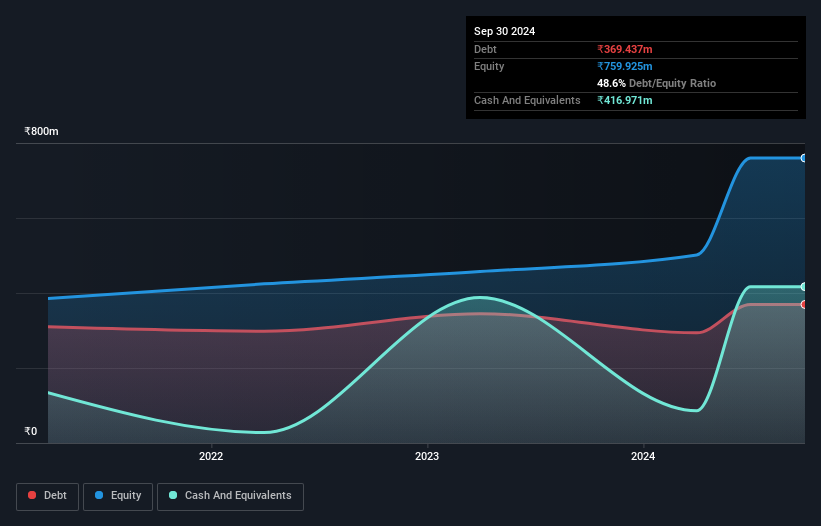Warren Buffett famously said, 'Volatility is far from synonymous with risk.' When we think about how risky a company is, we always like to look at its use of debt, since debt overload can lead to ruin. Importantly, Phoenix Overseas Limited (NSE:PHOGLOBAL) does carry debt. But the more important question is: how much risk is that debt creating?
Why Does Debt Bring Risk?
Debt is a tool to help businesses grow, but if a business is incapable of paying off its lenders, then it exists at their mercy. In the worst case scenario, a company can go bankrupt if it cannot pay its creditors. However, a more common (but still painful) scenario is that it has to raise new equity capital at a low price, thus permanently diluting shareholders. Of course, plenty of companies use debt to fund growth, without any negative consequences. When we think about a company's use of debt, we first look at cash and debt together.
Check out our latest analysis for Phoenix Overseas
What Is Phoenix Overseas's Debt?
The image below, which you can click on for greater detail, shows that at September 2024 Phoenix Overseas had debt of ₹369.4m, up from ₹293.7m in one year. However, its balance sheet shows it holds ₹417.0m in cash, so it actually has ₹47.5m net cash.

How Healthy Is Phoenix Overseas' Balance Sheet?
We can see from the most recent balance sheet that Phoenix Overseas had liabilities of ₹526.5m falling due within a year, and liabilities of ₹19.0m due beyond that. On the other hand, it had cash of ₹417.0m and ₹108.1m worth of receivables due within a year. So its liabilities outweigh the sum of its cash and (near-term) receivables by ₹20.4m.
Of course, Phoenix Overseas has a market capitalization of ₹458.5m, so these liabilities are probably manageable. But there are sufficient liabilities that we would certainly recommend shareholders continue to monitor the balance sheet, going forward. Despite its noteworthy liabilities, Phoenix Overseas boasts net cash, so it's fair to say it does not have a heavy debt load!
Sadly, Phoenix Overseas's EBIT actually dropped 5.5% in the last year. If that earnings trend continues then its debt load will grow heavy like the heart of a polar bear watching its sole cub. When analysing debt levels, the balance sheet is the obvious place to start. But you can't view debt in total isolation; since Phoenix Overseas will need earnings to service that debt. So when considering debt, it's definitely worth looking at the earnings trend. Click here for an interactive snapshot.
Finally, a company can only pay off debt with cold hard cash, not accounting profits. While Phoenix Overseas has net cash on its balance sheet, it's still worth taking a look at its ability to convert earnings before interest and tax (EBIT) to free cash flow, to help us understand how quickly it is building (or eroding) that cash balance. Over the last three years, Phoenix Overseas actually produced more free cash flow than EBIT. That sort of strong cash conversion gets us as excited as the crowd when the beat drops at a Daft Punk concert.
Summing Up
We could understand if investors are concerned about Phoenix Overseas's liabilities, but we can be reassured by the fact it has has net cash of ₹47.5m. The cherry on top was that in converted 124% of that EBIT to free cash flow, bringing in ₹72m. So we don't have any problem with Phoenix Overseas's use of debt. There's no doubt that we learn most about debt from the balance sheet. However, not all investment risk resides within the balance sheet - far from it. For instance, we've identified 1 warning sign for Phoenix Overseas that you should be aware of.
If, after all that, you're more interested in a fast growing company with a rock-solid balance sheet, then check out our list of net cash growth stocks without delay.
New: Manage All Your Stock Portfolios in One Place
We've created the ultimate portfolio companion for stock investors, and it's free.
• Connect an unlimited number of Portfolios and see your total in one currency
• Be alerted to new Warning Signs or Risks via email or mobile
• Track the Fair Value of your stocks
Have feedback on this article? Concerned about the content? Get in touch with us directly. Alternatively, email editorial-team (at) simplywallst.com.
This article by Simply Wall St is general in nature. We provide commentary based on historical data and analyst forecasts only using an unbiased methodology and our articles are not intended to be financial advice. It does not constitute a recommendation to buy or sell any stock, and does not take account of your objectives, or your financial situation. We aim to bring you long-term focused analysis driven by fundamental data. Note that our analysis may not factor in the latest price-sensitive company announcements or qualitative material. Simply Wall St has no position in any stocks mentioned.
About NSEI:PHOGLOBAL
Phoenix Overseas
Engages in the trading and marketing of animal feeds, and agricultural produce and commodities in India.
Adequate balance sheet second-rate dividend payer.
Market Insights
Community Narratives



